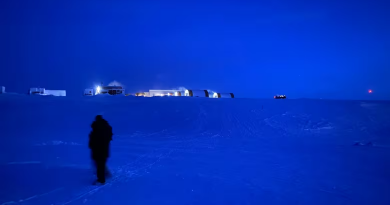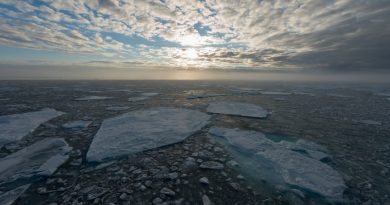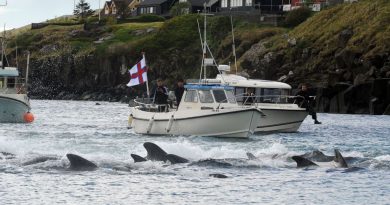Arctic warming twice as fast as previously thought, says Finnish study

The results of the study suggest that the Arctic region is more vulnerable to global warming than has previously been understood.
Temperatures in the Arctic region have been rising at a rate of nearly four times as fast as the rest of the world, according to the results of a study conducted by a team of Finnish researchers.
Previous studies have found that the rate was about twice as fast compared to other parts of the globe.
However, this recent study — which was published(siirryt toiseen palveluun) in the Communications Earth and Environment journal — found a much higher difference after comparing temperature changes in the Arctic region to the global average from 1979 onwards. This is a phenomenon known as Arctic amplification.
“The amazing thing is that the ratio is significantly higher than what has been reported in literature or in the media,” researcher Mika Rantanen of the Finnish Meteorological Institute said.
“We are used to hearing that the Arctic is warming twice as fast as the global average. We wanted to sort of update this long-standing belief.”
The research team further found that in some areas the relative warming rate was even faster: in the Barents Sea, for example, the rate was up to seven times higher.
Defining the Arctic
Global warming is widely believed to have started in the 1970s, and more accurate climate data from weather satellites became available at the end of that decade.
“Satellite data is particularly important in the Arctic, where there are few observation stations. The data available from 1979 onwards is more accurate,” Rantanen said as an explanation for the time frame chosen for the study.
The results of the study are also affected by how the Arctic is defined, as the region includes parts of the United States, Canada, Greenland, Norway, Sweden, Finland and Russia.
According to the definition used by the Finnish research team, the Arctic region’s boundaries lie at the Arctic Circle. Rantanen noted that some studies may have defined the region differently.
“Some are even defined at 60° latitude, which would make the whole of Finland an Arctic region. I live in Lahti, and I don’t really think of myself as living in the Arctic,” Rantanen said.
Sea ice has major impact
The rise in temperatures was found to have been most pronounced in areas where sea ice has receded. Over the past few decades, the Arctic has been largely covered by sea ice but open sea water radiates heat into the air, which intensifies the process of warming.
“It’s a vicious circle: climate change reduces sea ice, which causes sea ice to melt, which in turn causes the climate to warm even more. This is the main reason why the polar regions are warming faster than the Earth on average,” Rantanen explained.
The IPCC’s Intergovernmental Panel on Climate Change has predicted(siirryt toiseen palveluun) that the Arctic Ocean will be ice-free before 2050, as the rate of melting has accelerated in recent decades.
“Areas that have warmed in recent decades as sea ice has melted may not warm as much in the future, because most of the sea ice in these areas has already disappeared,” Rantanen noted.
Differences in the intensity of warming may also have been influenced by natural climate variations in the Arctic, Rantanen further pointed out, and it is possible that the situation will be reversed in the future with long-term fluctuations working in the opposite direction and gradually slowing down the rate of warming.
“If you only calculate the warming ratio for, say, the last fifteen years, the ratio is slightly lower. There is some evidence that warming has levelled off slightly in the Arctic, but we cannot draw far-reaching conclusions from this,” he said.
Although researchers believe that the pace of change may level off in the near future, Rantanen noted that his team are “somewhat speculative” about future developments.
Related stories from around the North:
Canada: Climate change affecting composition of forests in Yukon, Canada, study finds, CBC News
Finland: Especially warm and rainy July for Arctic Finland, Yle News
Greenland: Equipment for Arctic ice survey tested this summer in German highlands, Eye on the Arctic
Norway: Heatwave across northern Scandinavia, The Independent Barents Observer
Russia: Record-breaking heat followed by extreme cold on Russian Arctic coast, The Independent Barents Observer
United States: Could melting Arctic sea ice be responsible for U.S. wildfires?, Eye on the Arctic



